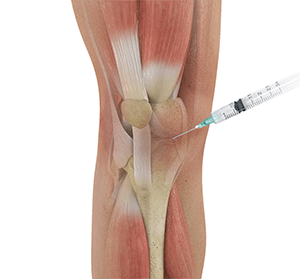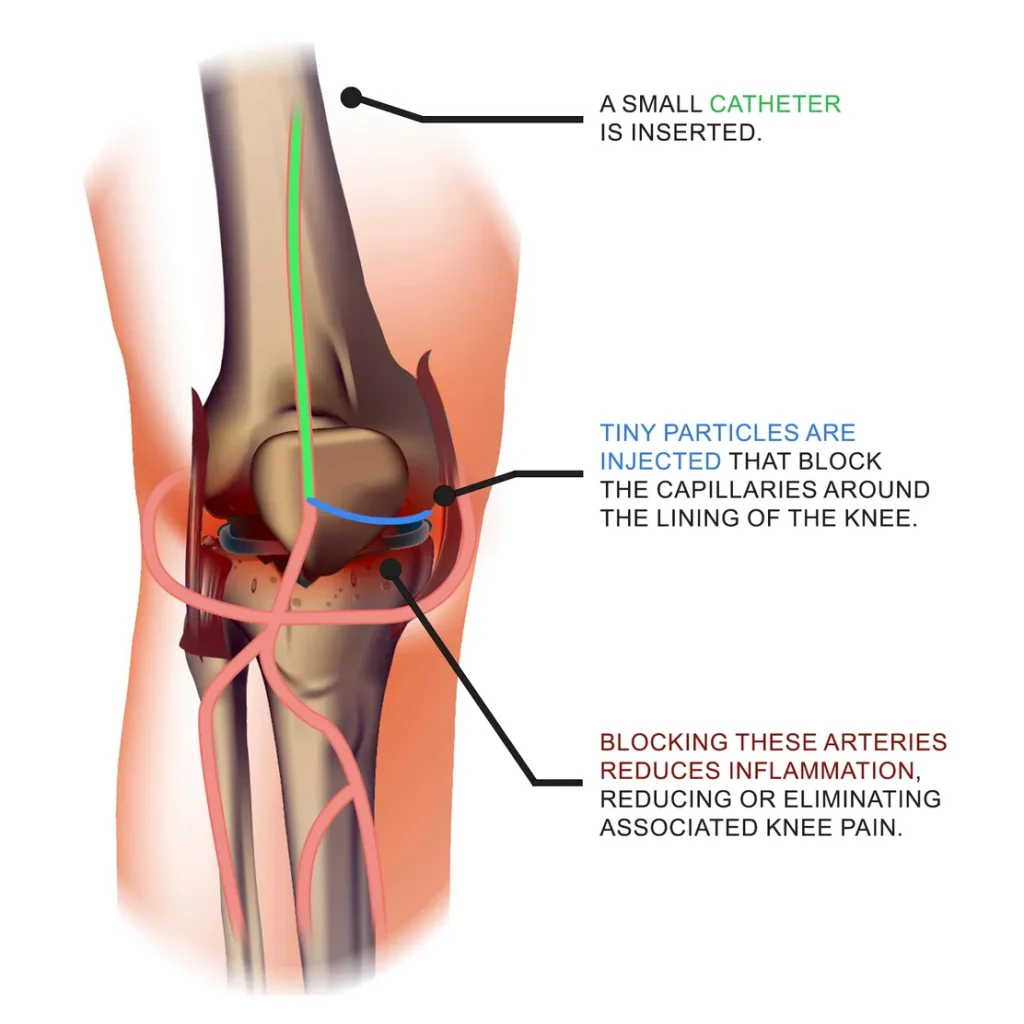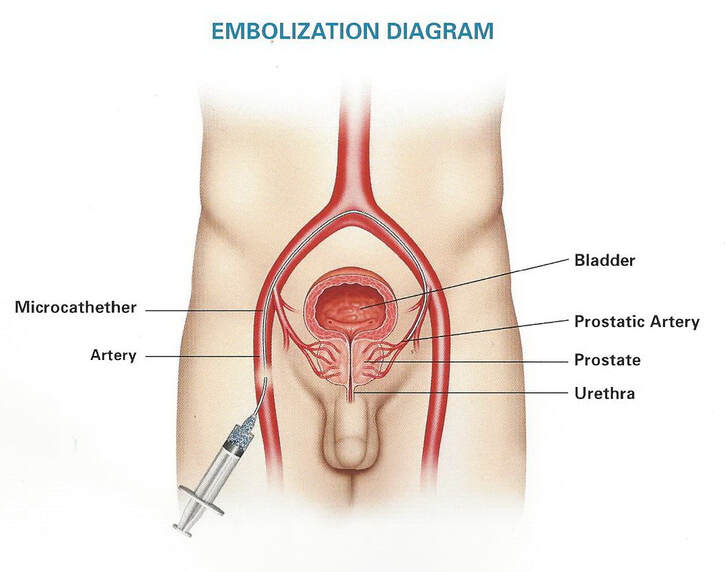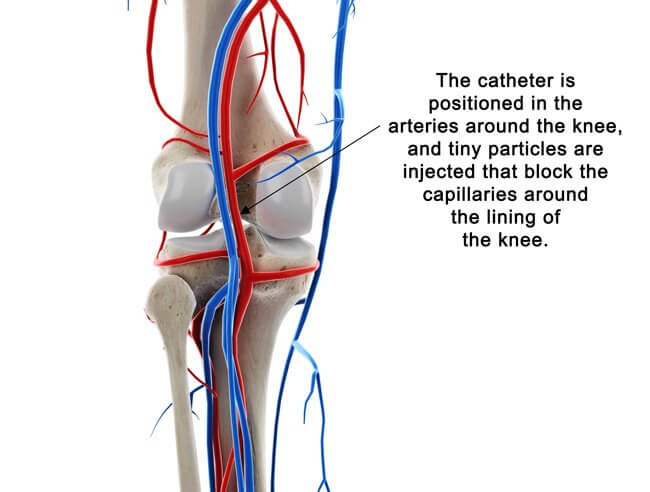Genicular Artery Embolization
Genicular Artery Embolization (GAE) Treatment in Bangalore
Minimally Invasive Knee Pain Relief by Vascular & Endovascular Specialist – Dr. Sravan C.P.S
Chronic knee pain affects work, sleep, travel, and daily life.
Most people are told to live on painkillers, try injections, and then “wait” until they are ready for knee replacement.
Genicular Artery Embolization (GAE) offers a better path for many of these patients.
It is a minimally invasive, pinhole procedure that targets the blood supply driving inflammation and pain in the knee.
There is no open surgery, no big cut, and usually a very short hospital stay.
In Bangalore, GAE is performed by Vascular & Endovascular Specialist, Dr. Sravan, at a centrally located hospital in Basavanagudi, easily reachable from Jayanagar, JP Nagar, Banashankari, Wilson Garden and CBD Bangalore.
What Is Genicular Artery Embolization And Why Is It Different?
The knee receives blood from small vessels called genicular arteries.
In knee osteoarthritis and chronic inflammation, some of these arteries become overactive.
They feed the inflamed tissues that keep sending pain signals.
Genicular Artery Embolization (GAE):
Uses a tiny catheter and X-ray guidance
Finds the genicular arteries linked to pain
Blocks them using microscopic particles
Reduces excess blood flow and inflammation
Aims to lower pain without cutting the joint
Compared to repeated injections and long-term drugs, GAE:
Targets the source of inflammation more directly
Avoids repeated steroid use
Helps many patients delay or avoid knee replacement, when suitable
For the right patient, GAE can be the most logical next step between medicines and major surgery.
How Does GAE Work?
GAE is an image-guided vascular procedure done in a specialised cath lab.
Entry point preparation
The skin over the wrist or groin is cleaned and numbed with local anaesthesia.Catheter insertion
A small puncture is made.
A thin, flexible catheter is placed into the artery.Reaching the knee arteries
Under live X-ray (fluoroscopy), the catheter is gently moved into the arteries of the thigh and then into the genicular arteries around the knee.Mapping the pain vessels
Contrast dye is injected.
This shows which genicular arteries are supplying the inflamed and painful areas.Targeted embolization
Through a micro-catheter, tiny embolic particles are injected into selected genicular arteries.
These particles reduce blood flow to the inflamed tissue.Completion
Once the target vessels are treated, the catheter is removed.
A small dressing is applied at the puncture site.
After the procedure:
Most patients stay for observation for a few hours
Many go home the same day or after one night, as advised
Pain relief usually builds up over weeks, not just days, as inflammation calms down
Who Should Consider Genicular Artery Embolization?
GAE is designed for chronic knee pain, most often due to knee osteoarthritis.
You may be a candidate if:
You have knee pain for more than 3–6 months
Pain increases with walking, stairs, or standing
Pain or stiffness makes it hard to get up from a chair
You wake at night because of knee pain
You have tried medicines and physiotherapy with only partial relief
Injections (steroid / hyaluronic acid) help only for a short time
You are not ready or not fit for knee replacement surgery
In these situations, GAE offers a structured, minimally invasive option before taking the big step of joint replacement.
However:
If the joint is completely destroyed or severely deformed, knee replacement may still be the main solution.
This is why orthopaedic and vascular evaluation together is important.





Treatment Options for Chronic Knee Pain – Where GAE Fits, and Why It Is Often Better
Knee pain treatment usually follows a ladder:
Lifestyle changes
Medicines
Injections / basic procedures
GAE and other advanced minimally invasive options
Knee replacement surgery
4.1 Lifestyle and self-care
Weight reduction to reduce load on knees
Regular low-impact exercise (walking, cycling, physio routines)
Avoiding deep squats and high-impact activities
Using knee supports when recommended
This step is essential, but not always enough once pain becomes moderate or severe.
Medicines
Pain relievers (under supervision)
Anti-inflammatory drugs (NSAIDs), as advised
Gels and sprays
These can give relief, but:
The effect often lasts only while you take them
Long-term NSAID use can affect the stomach, kidneys or heart
They do not directly change the inflamed blood supply
Injections and basic procedures
Steroid injections
Hyaluronic acid (viscosupplementation)
PRP or other injections in selected centres
Nerve-targeted procedures in some cases
These methods:
Can reduce pain for a period
Often need to be repeated
Still do not directly tackle abnormal blood flow in the joint lining
Where Genicular Artery Embolization Stands Out
Genicular Artery Embolization offers several key advantages:
It is pinhole and minimally invasive, not open surgery
It targets the overactive genicular arteries that feed painful inflammation
It can help when medicines and injections fail
It may delay or reduce the need for replacement surgery in suitable patients
It is often possible even when major surgery carries higher risk
In short:
For many patients stuck between “nothing works” and “I don’t want a knee replacement yet”,
GAE is often the most sensible next step.
Surgery (knee replacement)
Knee replacement remains important when:
Cartilage loss is severe
Deformity is marked
Daily function is very poor
It is a major surgery with its own benefits and recovery path.
However, not everyone is fit or ready.
For these patients, GAE gives a strong, minimally invasive option instead of just increasing medicines.
Why Choose Genicular Artery Embolization with Dr. Sravan in Bangalore?
“GAE is a vascular procedure. You need a vascular expert. That is Dr. Sravan.”
The right specialist for a vascular procedure
GAE is not an orthopaedic operation.
It is a vascular, catheter-based procedure on small arteries around the knee.
It demands:
Very detailed knowledge of leg and knee arterial anatomy
High-level skill in micro-catheter navigation
Precise, controlled embolization to avoid non-target branches
Dr. Sravan C.P.S is a Vascular & Endovascular Specialist, not a generalist.
He routinely works on delicate arteries and veins throughout the body.
This makes him exactly the kind of specialist you want for Genicular Artery Embolization.

Advanced imaging and cath lab in Basavanagudi, Bangalore
GAE with Dr. Sravan is performed in a Digital Subtraction Angiography (DSA) suite with:
High-resolution imaging of small genicular arteries
Real-time catheter tracking for safety
Controlled delivery of embolic particles only to selected targets
The hospital sits in Basavanagudi, with easy access from:
Jayanagar
JP Nagar
Banashankari
Wilson Garden
Central Business District (CBD) Bangalore and surrounding areas
You get advanced, specialised knee pain treatment in the heart of the city, without travelling long distances.
Structured, patient-centred knee pain pathway
With Dr. Sravan, GAE is not a random, one-off procedure.
It is part of a structured knee pain plan:
Review of your reports (X-ray / MRI / previous treatments)
Discussion with orthopaedic colleagues when needed
Clear explanation of all options – including non-GAE options
Transparent discussion of what GAE can and cannot do
Planned follow-up to track pain scores and function
This approach ensures that GAE is used where it makes real sense, not just because it is new or trending.
Preferred choice for patients who want a minimally invasive solution
Many patients reach Dr. Sravan after:
Trying several rounds of injections
Taking multiple painkillers for months
Being told to “wait for replacement” but still suffering
For suitable cases, GAE with Dr. Sravan:
Offers realistic expectations
Focuses on pain reduction and better function
Helps many patients delay or avoid major surgery for a time, depending on disease stage
This combination of expertise, infrastructure, and honest counselling is what makes GAE with Dr. Sravan a leading choice in Bangalore.
FAQ – Genicular Artery Embolization (GAE) in Bangalore
1. What is genicular artery embolization?
Genicular artery embolization is a minimally invasive procedure that blocks selected small arteries around the knee to reduce inflammation and chronic pain.
2. Is GAE better than taking painkillers and injections?
For many patients with long-term knee pain, GAE offers more durable relief than repeated medicines or injections because it targets the blood supply driving the pain.
3. Can GAE replace knee replacement surgery?
GAE can delay or reduce the need for knee replacement in suitable patients, but very advanced joint damage may still require surgery.
4. Who is a good candidate for GAE?
People with chronic knee pain, usually from osteoarthritis, who do not get enough relief from medicines, physio, and injections, and who are not ready or not fit for knee replacement.
5. How long does the GAE procedure take?
The procedure usually takes about 60–90 minutes, depending on the patient’s arterial anatomy.
6. How soon can I walk after GAE?
Most patients start walking the same day or the next day, with gradual increase in activity as advised by the doctor.
7. How long does pain relief from GAE last?
Pain relief builds over weeks and can last many months or longer in several patients, depending on knee damage and lifestyle factors.
8. Is GAE safe?
GAE is generally safe when performed by a trained vascular and endovascular specialist, but, like any procedure, it has some risks that are explained before treatment.
9. Why choose GAE with Dr. Sravan in Bangalore?
Because GAE is a vascular procedure, it needs a vascular expert. As a Vascular & Endovascular Specialist with advanced cath lab support in Basavanagudi, Dr. Sravan offers precise, targeted GAE with a structured knee pain care pathway.
10. How do I book a consultation for GAE?
You can contact the hospital in Basavanagudi, Bangalore where Dr. Sravan practices and request an appointment for chronic knee pain evaluation and discussion about GAE.
